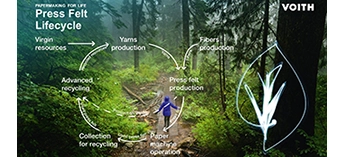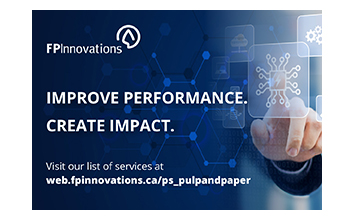In The Spotlight
April 16, 2024 - Earlier today, Forest Products Association of Canada (FPAC) President and CEO Derek Nighbor released the following statement in response to the 2024 Federal Budget tabled by Deputy Prime Minister and Minister of Finance, the Honourable Chrystia Freeland.
Feature Articles
Top Stories
In a blog article last year, I wrote about the potential of high-temperature heat pumps (HT-HPs) to save energy in papermaking.
In mid-January, VTT, the research institution based in Helsinki, announced an “Emission-Free Pulping” research program, a five-year €15 million research project to “significantly reduce biomass burning and increase the product yield of wood material used for pulping from approximately 50% to around 70%.”
Eucalyptus is a genus encompassing about 700 species of shrubs and trees. Depending on the species and your point of view, eucalypti are either invasive species that threaten our water supply or incredibly productive species that are being used to disrupt traditional pulp markets.
Three years ago, an overview of the French paper and pulp industry was carried out. Since then, the world has endured a pandemic and an economic downturn.
Fibre moulding is an area that is developing rapidly, not least because new technologies enable the manufacture of products with properties that can compete with plastic applications.
In my last blog contribution I described the series of large investments that forest industry companies are doing in Sweden and Finland.
Did you know that FPInnovations offers various training courses for mill staff, from new hires to experienced employees needing to expand their technical skills?
The adoption of zero emission medium- and heavy-duty vehicles and the development of these technologies is accelerating with transportation companies beginning to integrate zero emission vehicles into their fleets as replacements (or additions to) diesel internal combustion engines.
View the list of FPInnovations’ most recent reports, publications, and recordings, as well as other items recently made available through the research library.
Europe’s sawlog market has been turbulent over the past three years, with wood demand falling, log flows shifting, and sawlog prices going through unprecedented swings.
The global wood fiber market has changed substantially over the past three years.
The Global Sawlog Prices Index (GSPI) fell 1.6% in the 2Q/23 quarter-over-quarter (QoQ).
April 16, 2024 - Earlier today, Forest Products Association of Canada (FPAC) President and CEO Derek Nighbor released the following statement in response to the 2024 Federal Budget tabled by Deputy Prime Minister and Minister of Finance, the Honourable Chrystia Freeland.
As global leaders representing government, business and the environment meet in Vancouver this week, Forest Products Association of Canada (FPAC) has launched an important report entitled; Climate Change Mitigation in Canada's Forest Products Sector: Roadmap Toward Net-Zero.
The Chisholm Awards for Innovation in Forestry, now in its third year, is opening its doors once again to celebrate the innovative spirit and leadership of young students and researchers in Canada’s forest sector.





































